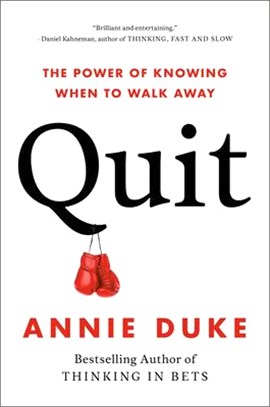目前查詢
歷史查詢

Quit :the power of knowing when to walk away /
- 館藏(1)
- 書目資訊
- 心得(0)
- 機讀格式
- 標籤
書名 : Quit :the power of knowing when to walk away /
紀錄類型 : 書目-語言資料,印刷品: 單行本
正題名[資料類型標示]/作者 : Quit :Annie Duke.
其他題名 : the power of knowing when to walk away /
作者 : Duke, Annie,
出版者 : [New York, NY] :Portfolio/Penguin,2022.
面頁冊數 : xxvi, 308 p. :ill. ;22 cm.
內容註 : Section I. The case for quitting. The opposite of a great virtue is also a great virtue ; Quitting on time usually feels like quitting too early ; Should I stay, or should I go? -- Interlude I. Quitting while the world is watching -- Section II. In the losses. Escalating commitment ; Sunk cost and the fear of waste ; Monkeys and pedestals -- Interlude II. Gold or nothing -- Section III. Identity and other impediments. You own what you've bought and what you've thought: Endowment and the status quo bias ; The hardest thing to quit is who you are: Identity and dissonance ; Find someone who loves you but doesn't care about hurt feelings -- Interlude III. The ants go marching ... mostly -- Section IV. Lessons from forced quitting ; The myopia of goals.
標題 : Failure (Psychology).
ISBN : 9780593422991
LEADER 02900cam 2200181 a 4500
001 1161409
005 20230817092822.0
008 230825s2022 nyua g b 001 0 eng d
010 $a 2022018987
020 $a9780593422991$q(hbk.) :$cUSD28.00
040 $aDLC$beng$cDLC$dOCLCF$dOPW$dRNL$dUAP$dCGB$dYDX$dPAE$dTWTNM
050 00$aBF575.F14$bD85 2022
082 04$a158.1$222
100 1 $aDuke, Annie,$d1965-
245 10$aQuit :$bthe power of knowing when to walk away /$cAnnie Duke.
260 $a[New York, NY] :$bPortfolio/Penguin,$c2022.
300 $axxvi, 308 p. :$bill. ;$c22 cm.
504 $aIncludes bibliographical references (p. 281-296) and index.
505 0 $aSection I. The case for quitting. The opposite of a great virtue is also a great virtue ; Quitting on time usually feels like quitting too early ; Should I stay, or should I go? -- Interlude I. Quitting while the world is watching -- Section II. In the losses. Escalating commitment ; Sunk cost and the fear of waste ; Monkeys and pedestals -- Interlude II. Gold or nothing -- Section III. Identity and other impediments. You own what you've bought and what you've thought: Endowment and the status quo bias ; The hardest thing to quit is who you are: Identity and dissonance ; Find someone who loves you but doesn't care about hurt feelings -- Interlude III. The ants go marching ... mostly -- Section IV. Lessons from forced quitting ; The myopia of goals.
520 $a"Business leaders, with millions of dollars down the drain, struggle to abandon a new app or product that just isn't working. Governments, caught in a hopeless conflict, believe that the next tactic will finally be the one that winsthe war. And in our own lives, we persist in relationships or careers that no longer serve us. Why? According to Annie Duke, in the face of tough decisions, we're terrible quitters. And that is significantly holding us back. In Quit, Duke teaches you how to get good at quitting. Drawing on stories from elite athletes like Mount Everest climbers, founders of leading companies like Stewart Butterfield, the CEO of Slack, and top entertainers like Dave Chappelle, Duke explains why quitting is integral to success, as well as strategies for determining when to hold em, and when to fold em, that will save you time, energy, and money. You'll learn: How the paradox of quitting influences decision making: If you quit ontime, you will feel you quit early. What forces work against good quitting behavior, such as escalation commitment, desire for certainty, and status quo bias. How to think in expected value in order to make better decisions, as well as otherbest practices, such as increasing flexibility in goal-setting, establishing "quitting contracts," anticipating optionality, and conducting premortems and backcasts. Whether you're facing a make-or-break business decision or life-altering personal choice, mastering the skill of quitting will help you make the best next move"--$cProvided by publisher.
650 0$aFailure (Psychology).
650 0$aChoice (Psychology).
650 0$aPersistence.
650 0$aSuccess.
